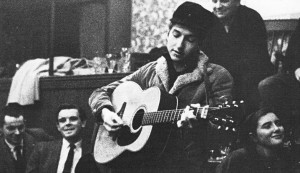Dylan was young!

Just as a 69-year-old man named Bob Dylan rolls into the Riviera Theatre on Saturday, his record label digs up a body of work by someone of the same name and nearly 50-years younger.
The Witmark Demos: 1962-1964 (The Bootleg Series Vol. 9) (Columbia/Legacy) does not purport to do anything unexpected or unknown. Like the rest of the “Bootleg Series,” most of its contents have circulated for years, though this version falls much more squarely in the camp of historical documents than the others. The difference between it and Royal Albert Hall Concert lies in the title: Dylan was a young folk singer hired to write songs for the Witmark subsidiary of Warner Bros. publishing.
The two-discs almost stiflingly comprise fables and morals, a litany of classic tales that begin to morph from passed-down folk songs into legitimate Dylan originals, but only slightly. The Robin Hood archetype in “Rambling, Gambling Willie” could have been contrived in any of the previous 100 years, and though his mastery of protest anthems (“The Death Of Emmett Till,” “Masters Of War,” “John Brown”) took on a life of its own, it wasn’t until he risked himself by plugging in his more personal emotions (“Tomorrow Is A Long Time,” “Don’t Think Twice, It’s All Right,” “Mama, You Been On My Mind”) that you feel his vocabulary really expand.
That said, The Witmark Demos eats up an awful lot of time to demonstrate that maturation, even if it’s to underline how thoroughly Dylan destroyed Tin Pan Alley and rewrote the music-publishing bible. The only real pleasure to be derived comes from hearing Dylan play piano on some of the acetates, which maybe he’ll do a little of on Saturday.
— Steve Forstneger












Yes, these tracks have been in circulation for years. But who wants to pay $50 or $100 for a bootleg version of these demos? Thanks to Dylan’s label for making these songs available to the “regular people.”